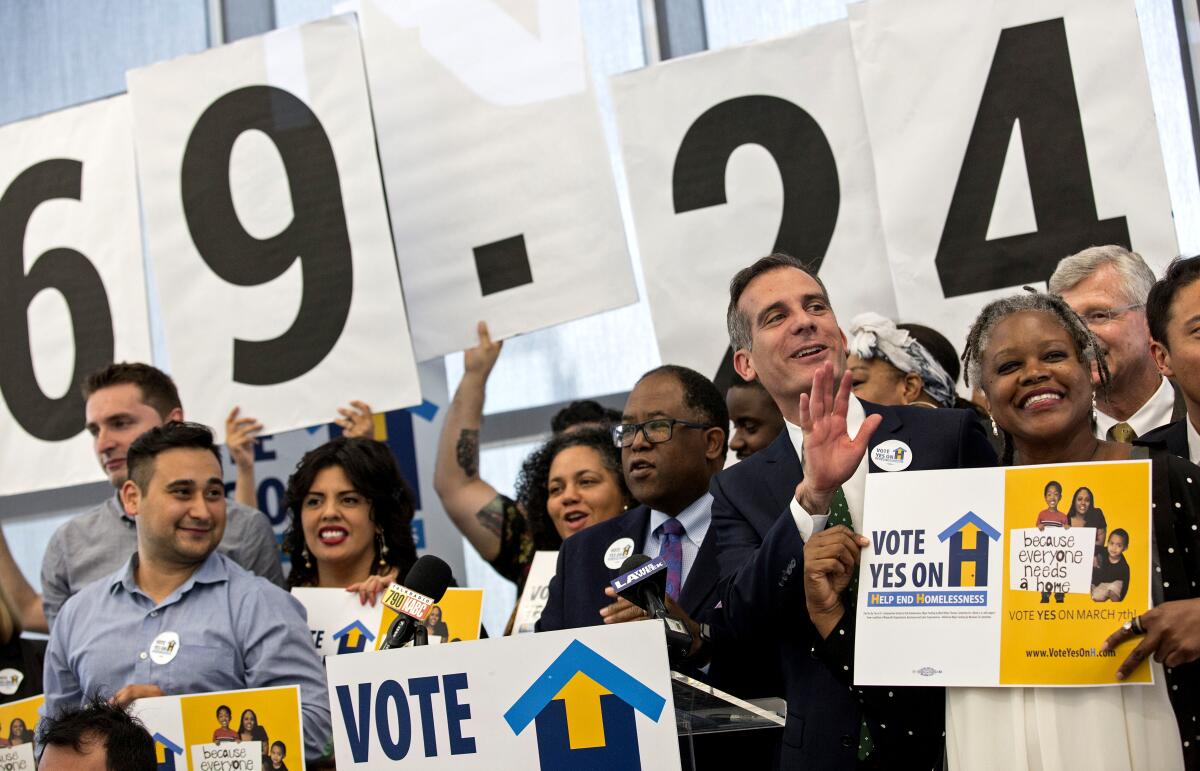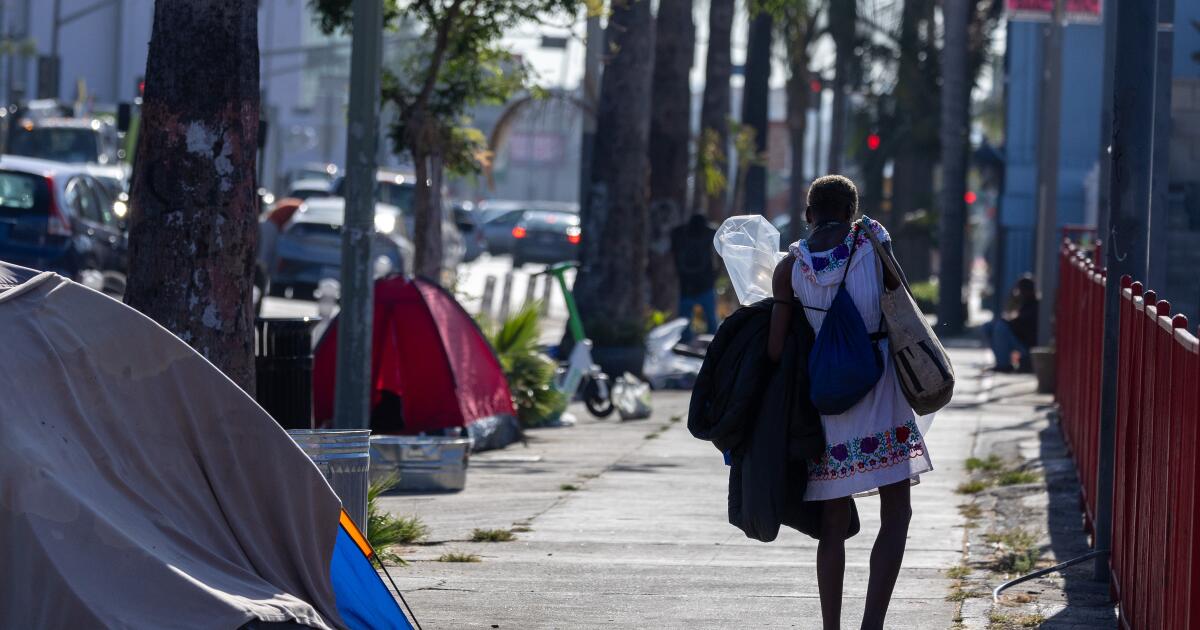A measure on the November ballot that would double the county’s quarter-cent homeless sales tax is leading in an early poll of Los Angeles County voters but but does not yet have enough support to pass.
Forty-seven percent of likely voters surveyed said they would vote for the new half-cent tax if the election were held immediately, a margin that falls three percentage points short of the majority needed to pass. Thirty-six percent said they would vote no, and 17% were undecided.
That tepid support was reflected in voters’ view of progress made with hundreds of millions of dollars raised under the current tax, called Measure H, that was approved by more than two-thirds of voters in 2017. Fifty-one percent said they were very dissatisfied with the results and 6% somewhat dissatisfied.
Despite spending by the county Homelessness Initiative that reached more than $600 million in the 2023-2024 budget, homelessness climbed steadily for five years before leveling off this year.
The poll, conducted between July 31 and Aug. 11 by the UC Berkeley Institute of Governmental Studies and co-sponsored by The Times, had a margin of error of three percentage points, making the race at this point a toss-up.
“I would say that 47% is interesting,” said Mark DiCamillo, director of the Berkeley IGS Poll. “It’s close. I expect a close election.”
The new measure — officially called the Affordable Housing, Homelessness Solutions and Prevention Now measure — would replace Measure H, which is set to expire in 2027, and extend it indefinitely unless repealed by a new vote.

Then Los Angeles County Supervisor Mark Ridley-Thomas, center, and then L.A. Mayor Eric Garcetti, right, with supporters of ballot Measure H as the final vote tallies are announced, passing by 69.24% in Los Angeles on March 17, 2017.
(Brian van der Brug/Los Angeles Times)
It is estimated that it would raise $1.2 billion annually.
The money would fund homelessness programs, including mental healthcare, substance abuse treatment, affordable housing, rental subsidies, job counseling and services for vulnerable populations including homeless families, veterans, abused women, seniors and disabled persons.
The 20-page ballot measure specifies that 60% of the revenue would be directed to homelessness services and 15% of that would be distributed to cities based on the annual point-in-time count. An additional 35.75% would go to the L.A. County Affordable Housing Solutions Agency, a new entity created last year by the California Legislature to help people stay in their homes and increase housing and shelter for people experiencing homelessness. The money could be used for rental assistance, purchase or lease of existing housing and new construction.
Backers of the measure said they designed it to make the strategy for using the funds more outcome-oriented and build in more explicit accountability than in Measure H.
It would require programs to set and meet specific targets and mandate regular audits to ensure those showing the highest rates of effectiveness receive sufficient funds.
Backers of the measure said they were not alarmed by responses to the the poll’s two questions on the sales tax, which came at the end of a lengthy series of questions about the race for Los Angeles County district attorney.

A homeless man waits for transportation to housing near encampments being cleaned up along Hollywood Boulevard and Gower Street on Thursday in Hollywood.
(Brian van der Brug/Los Angeles Times)
Their own polling earlier this year showed support of up to 60%. And the yes vote in the new poll, though short of 50%, was well ahead of the no.
“We were leading in our February poll and have an 11-point advantage in this poll because voters want to see a new strategy to create safer and cleaner neighborhoods by removing more encampments, providing more mental health treatment and holding programs accountable for reducing homelessness,” said campaign consultant Yusef Rob.
“If that funding is lost, homelessness will increase by at least 25% as people lose services and housing. No one wants to go backward, and not passing this measure would be catastrophic,” Rob said.
Two committees have been gearing up for a campaign set to kick off next month.
The Angeleno Project, a nonprofit that supports the measure, released polling in March showing likely support from 60% of likely voters, with 39% of respondents saying they would definitely support it, 15% that they support it but could change their mind, and 6% saying they leaned yes.
Breakdowns of the February survey results showed even higher support for specific elements of the measure: increasing mental health treatment for those experiencing homelessness (82%), preserving existing affordable housing (78%), reducing the cost of building affordable housing and housing for homeless people (77%), reducing the burden on local emergency rooms (74%), creating pathways out of poverty through construction (74%) and building more affordable housing (72%).
The new poll showed a strong split by political ideology and income. Those identified as liberal favored it by 68% compared with 23% for conservatives, and those with lower incomes were more likely to favor it. Sixty percent of those making between $60,000 and $99,999 said they would vote for it compared with only 31% of those making $100,000 to $199,999.
DiCamillo said the Berkeley IGS Poll will survey voters again in September and October.
“As we get closer and closer we’ll get a more refined view of the likely voters,” DiCamillo said. “Nobody really can project accurately likely voters until you get really close to the election.”
